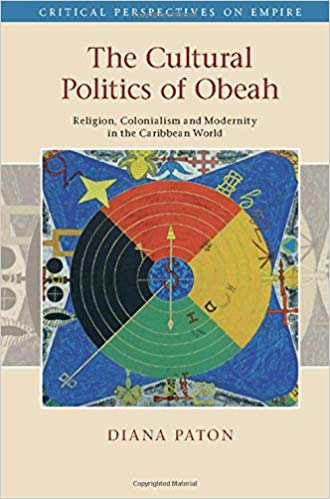Insights on Diana Paton's The Cultural Politics of Obeah
 In The Cultural Politics of Obeah: Religion, Colonialism and Modernity in the Caribbean World, historian Diana Paton explores obeah as an important practice and way of life for the people of the Caribbean. Paton dares to take obeah seriously and explores it not as a sign of Caribbean primitivism, but rather as a cultural practice with a deep history that keeps the people of the Caribbean connected not only to one another, but to their ancestors as well. Paton's work was critical to the creation of this exhibit, and is one of the few contemporary examinations of obeah. Paton's study spans the 18th and 19th centuries, with some reflection on how obeah is practiced in the modern day. The history of obeah is not always straightforward; there is evidence that obeah was practiced in the Caribbean in some form well before it went by the name of "obeah." And what is, and is not, obeah is not always clear either. Despite the complexity of obeah's history, Paton clearly traces its practice, and its origin, as well as the implications and effects of its cultural centrality in Caribbean history.
In The Cultural Politics of Obeah: Religion, Colonialism and Modernity in the Caribbean World, historian Diana Paton explores obeah as an important practice and way of life for the people of the Caribbean. Paton dares to take obeah seriously and explores it not as a sign of Caribbean primitivism, but rather as a cultural practice with a deep history that keeps the people of the Caribbean connected not only to one another, but to their ancestors as well. Paton's work was critical to the creation of this exhibit, and is one of the few contemporary examinations of obeah. Paton's study spans the 18th and 19th centuries, with some reflection on how obeah is practiced in the modern day. The history of obeah is not always straightforward; there is evidence that obeah was practiced in the Caribbean in some form well before it went by the name of "obeah." And what is, and is not, obeah is not always clear either. Despite the complexity of obeah's history, Paton clearly traces its practice, and its origin, as well as the implications and effects of its cultural centrality in Caribbean history.
The chapter "The Emergence of Caribbean Spiritual Politics" outlines how the enslaved and later formerly enslaved understood themselves and one another, as well as their relationships to European settler colonials. The chapter "Creole Slave Society, Obeah, and the Law" informs the Obeah and the Law section of this exhibit, which relies on Paton's account of the messy legalities of obeah, with particular emphasis on the inconsistent and non-sensical nature of the laws surrounding obeah. Finally, the chapter "Protest, Development, and the Politics of Obeah" provides an important look into the role of obeah not just as a spiritual practice/religion, but as a tool for the people of the Caribbean to strengthen, unite, and further their position as Caribbean people living in a post-colonial world.
Paton's greatest strength is that she understands and portrays obeah not just as a spiritual or religious practice, but views obeah and its followers as necessarily linked to the complex history of colonization and slavery. Obeah is a practice that speaks to the Caribbean people's separation from Africa and their ancestry as well as their political and social empowerment, despite the legal criminalization and social taboo associated with obeah. The Cultural Politics of Obeah is an invaluable text for anyone concerned with not just obeah, but Caribbean history as a whole.
